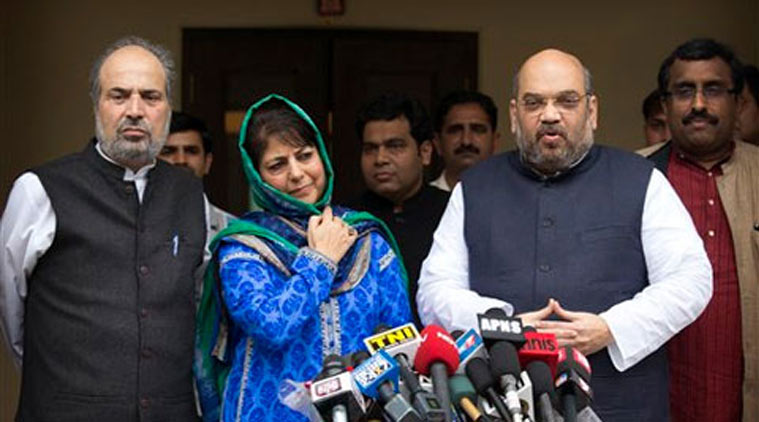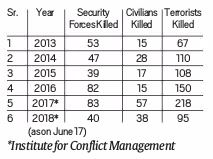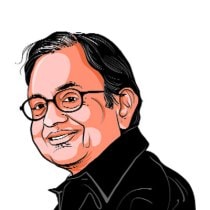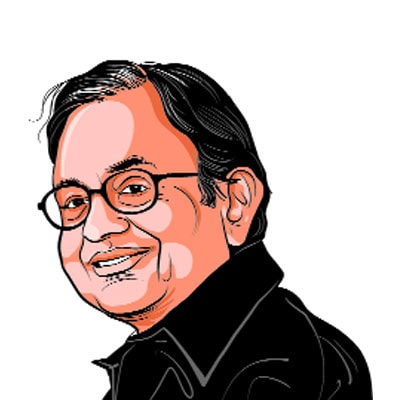Across the aisle: The remains of the day
When the political parties demanded a ceasefire for the Ramzan month, the Chief of Army Staff had taken upon himself the responsibility of answering the demand and had said, “Azaadi is not going to happen, never... if you want to fight us, then we will fight you with all our force.” Following the imposition of Governor’s rule, he repeated the cliched phrase that “anti-terror operations will continue” and added “we don’t have any kind of political interference”.

The BJP pulled out of the coalition government and the other partner, the PDP, had no choice but to resign.
Only a few weeks ago I had poured out my anguish in an essay titled ‘India is failing the test on J&K’ (May 13, 2018). I had no hesitation in blaming the BJP-led Central government’s policy for the rapidly deteriorating situation in Jammu and Kashmir, especially in the Kashmir valley.
The bottom of the policy collapsed a few days ago. The BJP pulled out of the coalition government and the other partner, the PDP, had no choice but to resign. J&K has come under Governor’s rule, which is a euphemism for direct rule by the Central government.
Not many in the rest of India seem to have comprehended the gravity of the situation. They were taken in by the pronouncements of those in authority, beginning with the Prime Minister. It is easy to be mesmerised by the promise that ‘infiltration will be stopped, terrorism will be stamped out, secessionists will be punished, peace will return to the state, and J&K will remain an integral part of India’. Every call to pause and reflect was rebuffed; every criticism was dubbed anti-national.
Recall their words
Lest you forget, the pointsman of the RSS and BJP spelt out the government’s policy on more than one occasion: “The government will stand firm, eruption or no eruption.” It is that government which collapsed on June 19, 2018, without even a token apology to the people of India.
The Home Minister had, a few months ago, made the intriguing statement that “a solution had been found to the J&K issue”. On June 20, 2018, after Governor’s rule was proclaimed, the minister directly in charge could only say, unconvincingly, “The Centre will not tolerate terrorism any longer.” Not a word about the mysterious solution that his government had found!
When the political parties demanded a ceasefire for the Ramzan month, the Chief of Army Staff had taken upon himself the responsibility of answering the demand and had said, “Azaadi is not going to happen, never… if you want to fight us, then we will fight you with all our force.” Following the imposition of Governor’s rule, he repeated the cliched phrase that “anti-terror operations will continue” and added “we don’t have any kind of political interference”.
The one person who did not speak (until Friday 6 pm) was the Prime Minister.
The price we paid
 I take no satisfaction that numerous persons have affirmed what I had said three years ago: that the PDP-BJP coalition was an unnatural and opportunistic alliance. It was rejected on Day One by the people of the Valley. The PDP was viewed as the betrayer and the BJP as the usurper. When a by-election was held in Srinagar constituency, the turnout was 7 per cent. The coalition was the main provocation for the increase in violence.
I take no satisfaction that numerous persons have affirmed what I had said three years ago: that the PDP-BJP coalition was an unnatural and opportunistic alliance. It was rejected on Day One by the people of the Valley. The PDP was viewed as the betrayer and the BJP as the usurper. When a by-election was held in Srinagar constituency, the turnout was 7 per cent. The coalition was the main provocation for the increase in violence.In the 48 months since May 26, 2014, there has been more infiltration, more casualties and more violence than in any comparable period in the past.
Several fundamental principles have suffered major damage. Contrary to the written and unwritten rules, Army generals made political statements, the J&K Council of Ministers broke the principle of collective responsibility, the integrity of the state (consisting of three regions) was severely impaired, and the state unleashed violence against its own people, including its young citizens. The table below captures the deterioration in the situation since the BJP formed the Central government in 2014:
Unanswered Questions
Several questions arise:
1. Will Governor’s rule mean more of the ‘muscular, militaristic’ approach to quell protests? Who will be the Governor when Mr N N Vohra’s term comes to an end this month? (Mr Vohra is an old and seasoned hand, but his age is a factor against his continuance. The true intentions of the BJP will be revealed when a new governor is appointed.)
2. Will it be a one-point agenda under Governor’s rule: use massive force to stamp out terrorism? No one supports terrorism, but one cannot be blind to the fact that it is the unresolved political question that has motivated many young men to take to violence.
3. Will the government talk to the stakeholders? The present government utterly lacks credibility. Even if talks are offered, no one will talk to the government’s representatives. However good and well-meaning Mr Dineshwar Sharma may be, his usefulness is over. It is time for independent interlocutors drawn from civil society to attempt to re-engage with the people of J&K, but that seems impossible under the present dispensation.
4. Will there be fresh elections to the state legislature? There is the danger of a massive boycott of elections, at least in the Kashmir valley.
5. Will there be a war with Pakistan? It will take only a few short steps to go from ‘surgical strikes’ to a ‘limited war’. The temptation will be high, especially in the year leading to an election.
I cling to the hope that Kashmir is not lost forever, but the situation is pretty close to that catastrophe.
Website: pchidambaram.in @Pchidambaram_IN
For all the latest Opinion News, download Indian Express App
More From P Chidambaram
- Searching for Shangri-LaThe world’s leaders hear the Prime Minister and applaud his appeal to embrace diversity; and then they read about happenings in Dadri (Mohammed Akhlaq); Alwar…
- Across the aisle: Governments hide, people seekThe mood of the nation is despondent. In the RBI’s survey (May 2018), 48 per cent of respondents felt that the economic situation had worsened…
- Across the Aisle: Second-class citizens?Under the government of Mr Narendra Modi and his cohorts in the states, unlike the government of Mr Vajpayee, intolerance is the new normal...








































No hay comentarios:
Publicar un comentario